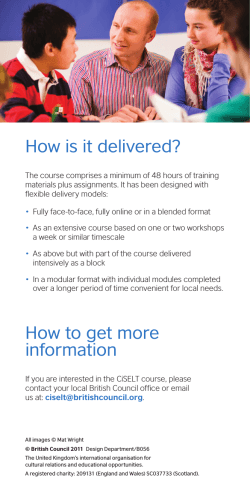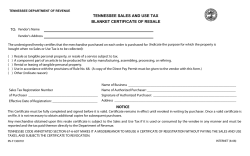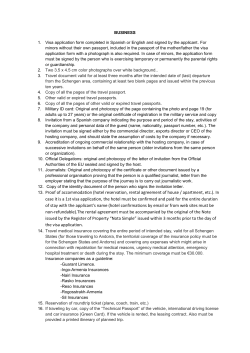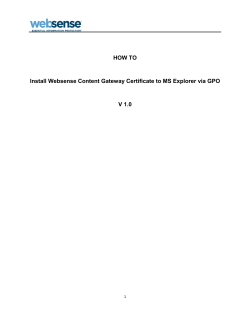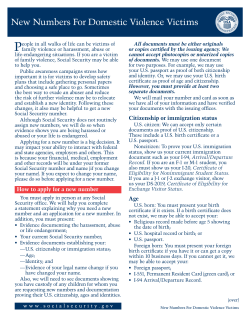
How to Register the Birth of a Child
How to Register the Birth of a Child Registering the birth of your child is very important. This booklet will tell you: ffwhy it is important to register a child’s birth ffhow to register the birth of a child ffrules for different types of birth registration ffrules for registering the birth of a child born outside marriage ffwhat to do if you lose your child’s birth certificate. This booklet is based on the Births, Marriages and Deaths Registration Act 81 of 1963, with additional information provided by the Ministry of Home Affairs and Immigration. Any child born in Namibia can get a Namibian birth certificate, even if the parents are not Namibian citizens. 1 Why should you register your child’s birth? When a child’s birth is registered, the parent is given a formal document called a birth certificate. A birth certificate proves your child’s identity, date of birth, place of birth, and the name of one or both parents. There are many important reasons to register the birth of a child: ffThe Namibian Constitution says that children have a right to a name and a nationality. A birth certificate is usually the first step to secure this right. ffThe law says that every parent has a duty to register the birth of his or her child, as soon as possible following the birth. ffIf your child was born in Namibia or to Namibian parents, the birth certificate will help prove that your child is a Namibian citizen. ffWithout a birth certificate for your child, you will find it more difficult to register your child in school, obtain health services or qualify for state grants. Your child may also need a birth certificate as proof of age for school sports teams. ffYour child will need a birth certificate to get an ID card when he or she reaches age 16. You need a birth certificate and ID card to get a passport, to vote, to get a driver’s licence or to get married. Your child may need a birth certificate to do things such as open a bank account or to work in some jobs. BIRTH CERTIFICATE HELPS YOU WITH … SCHOOL ID CARD STATE HOSPITAL D RIV E R ’S LIC EN C E PASSPORT BA N K CA RD PENSION / WELFARE PAYMENT VOTER’S CARD ffBirth registration also helps the Government know how many children are living in different regions of Namibia. This helps the Government decide what type of services and funding each region needs. You should try to register the birth of your child as soon as possible (within 14 days of the birth is best). The older the child, the more difficult it will be to collect the documents you need to register the birth. The majority of unregistered children or children who are registered late are children from society’s most socially and economically vulnerable groups. Registering the birth of your child is one step towards getting out of the cycle of vulnerability. Birth registration is free. There are no costs or fees. 2 Six reasons your child needs a birth certificate 1. To 2. To 3. To 4. To 5. To 6. To access health services such as immunisation access social welfare grants enrol at school get an ID card or a passport get married vote It is possible to do most of these things without a birth certificate, but it will be much harder because a birth certificate is the easier way to prove exact age. What is a birth certificate? A birth certificate is an official document issued by the Ministry of Home Affairs and Immigration that proves the child’s identity, date of birth, place of birth, and the name of one or both parents. What is an identification card? An identification card (also known as an ID card) is an official document issued by the Ministry of Home Affairs and Immigration that proves a person’s identity. It has a photograph of the person. It lists the person’s name, place and date of birth, and identification number. Every child in Namibia should have both a birth certificate and an ID card. You can apply for an ID card from age 16. How to register the birth of your child It is important that you register your child as soon as possible after birth. In some places, you can register at the hospital where you gave birth. If the hospital where you give birth does not provide this service, you should register the child at the nearest Ministry of Home Affairs and Immigration office. There are two different methods for birth registration, depending on how long after the child’s birth you apply. You need to bring certain documents with you, which are listed on page 5. If you provide all the required information, you will receive your child’s birth certificate immediately. 3 It will take time for me to collect the documents I need to register the birth of my child. I don’t think I will do it. But it is the child’s right! Every child needs to have a birth certificate as soon as possible after birth. This will help your child access services throughout life. It is your duty as a parent to make sure your child’s birth is registered. It is not a difficult process. What are the different methods of birth registration? If you register within one year of the child’s birth, the registration process is called “Notification of Birth”. It is also possible to register a child later in life, when the child is more than one year old. This is called “Late Registration of Birth”. The birth certificate will be the same either way. You should try to register your child within one year. This is because you will need to access health services for your child within this time. It is also easier to register a Notification of Birth than a Late Registration of Birth. How do I register my child at birth (or within the first year after the child’s birth)? You must follow the process for Notification of Birth. You need to bring these documents with you: ffProof of birth (child’s health passport) ffThe original or certified copy of the ID card and birth certificate for one or both parents. If you are a foreigner living in Namibia you should bring your passport and the permit giving you permission to be in Namibia. It is best that both parents come in person, if possible. If one of the parents has died, you should also bring a certified copy of the death certificate. ffIf the parents of the child are married to each other: Original or certified copy of marriage certificate or statement from the village headman/woman if the parents are married under customary law. 4 The clerk will help you to complete a HEALTH PASSPORT Birth Notification Form. It will be useful (of child) to take along any other papers that you OR got from the hospital when your baby was FOR LATE born. If you have lost your own documents, REGISTRATION you should first apply for replacement copies BAPTISMAL at the nearest Ministry of Home Affairs and CERTIFICATE Immigration office and then register the birth of your (of child) child. If you still have problems or do not have all the documents that you need, you should speak to the AND clerk at the Ministry of Home Affairs and Immigration office for advice. BIRTH CERTIFICATE + (of parent) ID CARD How do I register my child (of parent) after he or she is more than one year old? OR IF PARENT IS NOT NAMIBIAN You must follow the process for Late Registration of Birth. You will need the same documents as for Notification of Birth. If you do not have your child’s health passport you can use your child’s baptismal certificate. PASSPORT + PERMIT (of foreigner (for being parent) in Namibia) If you do not have the documents you need, the principal of the first school your child attended or the headman for your village can make a sworn statement called an affidavit to give information about your child’s age and identity. If you cannot provide any documentation, two witnesses who are five years older than the child must come with you to give information about your child’s age and identity. The child’s two parents can be the witnesses if there is really no one else who can give the necessary information. If you are registering the birth of a child who is over the age of 14, the Ministry requests that you bring the child along so that the child’s fingerprints can be taken as a standard security measure. Affidavits and certified copies are explained on page 9. 5 AND IF PARENTS ARE MARRIED PROOF OF MARRIAGE (Marriage Certificate or statement from traditional leader) OR IF PARENT IS DECEASED DEATH CERTIFICATE (of parent) Who can apply for birth registration? Situation Who can register the birth? What is the surname on the child’s birth certificate? surnames: As this chart explains, your child will be given either your surname or the surname of the other parent. This means that the surname on either your ID card or the other parent’s ID card should match the surname the child is given. When your child is born and you are given a health passport, you should also make sure that the surname on your ID card or the other parent’s ID card matches the surname on the child’s health passport. Both parents want to register birth. Parents are married. Either parent. Both parents will be listed on the birth certificate. The parents must bring their marriage certificate The surname of the married parents. (If the parents use different surnames, they can choose which of these surnames to give to the child.) Both parents want to register birth. Parents are not married. Either parent. The father will be listed on the birth certificate only if both parents consent to this. The father should be present, or provide a sworn statement (an affidavit) that he has consented to be listed on the birth certificate. It can be the surname of either parent. The surname of the father will be used only if he and the mother both consent to this. The surname will otherwise be the surname of the mother. Mother or father wants to register birth. Parents are not married. The other parent is alive but not participating in the registration of the child. Mother or father. The mother is not required to give any information about the father if the parents are unmarried. The surname of the parent registering the birth. 6 Mother or father wants to register birth. The other parent is dead. The surviving parent. The mother is not required to give any information about the father if the parents are unmarried. You should take the death certificate of the deceased parent if you would like to have the name of the deceased parent entered on the birth certificate. The name of the deceased parent can only be entered when the birth certificate is issued for the first time. Deceased persons cannot be added to the birth certificate at a later date. If you provide a death certificate, the surname of either parent can be used. If you do not have the death certificate, the surname of the parent registering the child will be used. There are no parents living. The child is an orphan. The child’s caregiver can register the birth. Any document that proves the child’s identity and place of birth. This could include the parents’ identification cards, birth certificates and death certificates, or a letter from a headman, school principal or social worker. The surname of either parent, provided that there is sufficient information to prove the relationship. There are no parents living. The child is an orphan. Children can register their own birth when they are old enough. Two people must accompany the child. These people must be able to confirm that the child was born in Namibia. The people who are helping the child must have been born in Namibia, have a Namibian ID and be at least 5 years older than the child being registered. The surname of either parent, provided that there is sufficient information to prove the relationship. 7 We will call this child John van Wyk. Van Wyk is my father’s surname. But your surname is January. We need to write your surname, or the surname of the father. If we write a different surname here on the health passport, you will have problems registering the birth of your child. MISSING DOCUMENTS What if I do not have a birth certificate or an ID document for myself? If you do not have a birth certificate you should register yourself through the late registration of birth process. If you do not have an ID card but you do have a birth certificate, you should apply for an ID card at the nearest Ministry of Home Affairs and Immigration office. Then you can register the birth of your child. I have lost the proof of where my child was born. Can I still register my child? Yes, you can. You should go to the maternity ward where your child was born to ask for a copy of the proof of birth. If you are unable to get this proof, you will need to show some other proof of the child’s identity and place of birth. This could be one or more of the following: your child’s baptismal certificate, a sworn statement from a traditional leader, or a sworn statement from another person such as the principal of the child’s first school or a social worker. The traditional leader is asking me to pay a lot of money for a sworn statement. What can I do? You can get a sworn statement from another person, such as the principal of the child’s first school or a social worker or the pastor who baptised your child. 8 How do I make an affidavit (a sworn statement)? You make an affidavit with the help of a Commissioner of Oaths. You can find a Commissioner of Oaths at police stations, banks and law offices. To make an affidavit, you can write out the statement yourself, or you can ask the Commissioner to write down what you say. The Commissioner will ask you to swear that what you have said is true. Then you must sign the statement or make your mark on it while the Commissioner is watching. The Commissioner will then stamp the document to certify that it is a sworn statement. A statement made in this way is called an affidavit. How do I get a certified copy of a document? A certified copy is when a Commissioner of Oaths looks at the original document and swears that the photocopy is just like the original. You can find a Commissioner of Oaths at police stations, banks and law offices. You must show the original document and the copy to the Commissioner. The Commissioner will stamp the copy to show that it is an exact copy of the original. You can get certified copies of important documents so that you can leave the originals stored in a safe place instead of carrying them around. How to keep your child’s birth certificate safe Your child’s birth certificate is a very important document. You should keep it in a safe place. It is a good idea to make a certified copy of the birth certificate, in case you lose the original. You can use the certified copy in most cases where the birth certificate is required, rather than taking the original with you. What to do if you lose your child’s birth certificate If you lose your child’s birth certificate, you can apply for a copy of it from the Ministry of Home Affairs and Immigration. As of 2010, the cost to get a replacement birth certificate is N$30. The Ministry of Home Affairs and Immigration prefers that you apply for a replacement copy in the region where the child was born and NOT in the region where the child was registered. 9 Children born OUTSIDE marriage Many children in Namibia are born to parents who are not married to each other. If you are not married to your child’s other parent, there are special rules that apply when registering the child’s birth. Here are the answers to some common questions about registering a child born outside marriage. Do both parents need to give their permission to register the birth of a child outside marriage? No. Either parent can register the birth of a child born outside marriage. A mother who is registering the birth of a child outside marriage DOES NOT need to get permission from the father. A mother who is registering the birth of her child does not have to identify the father. If the mother does not want to give any details about the father, no one will be named as the child’s father on the birth certificate. Information about the father can be added at a later date, and the child can be given the father’s surname at this point if the mother consents. There is no cost for this addition. If the father is deceased, his name cannot be added after the initial registration. This rule is in the law. The clerk cannot force a woman to give any information about the child’s father if she wants to register the child’s birth in her own surname. Whose surname should be used if the child is born outside marriage? (1) If it is only the mother registering the child’s birth and the father is not listed on the birth certificate, then the child must be given the mother’s surname. The father does not have to consent if the mother wants to give the child her surname. (2) If both parents are named on the birth certificate, the child can be given either the mother’s surname or the father’s surname. The child can take the father’s surname only if both the mother and the father consent to this. 10 I am not married to the father and I do not want his name on our child’s birth certificate, but the father says that his name must be on the certificate. The father does not have an automatic right to be listed on the birth certificate. The law says that he can be listed on the birth certificate only with the mother’s consent. What happens if the child’s parents marry after the child is born? The registration of birth can be changed to register the birth as if the parents had been legally married to each other when the child was born. The previous record will be removed from the government’s files. The current law treats unmarried mothers and fathers differently. Is this unconstitutional sex discrimination? Some different treatment of mothers and fathers is justified by their biological differences. The mother will be present at the child’s birth, but the father may not be there. However, some of the rules in the law come from the past, when it was not easy to prove who was the father of a child. Now it is possible to use a type of medical testing (DNA testing) to identify a child’s father with great certainty. If a father can prove paternity, he might be able to argue that he has a right to be listed on a child’s birth certificate even if the mother objects. But the law must be obeyed as it stands until the Namibian courts rule on this question. I registered the birth of my child in my name because the father was not available. Can I add the name of the father at a later date? Yes, you can add the name of the father after the initial registration if he consents. There is no charge for this. But you cannot add the name of the father at a later date if he is dead. 11 Summary Notification of Birth When At the child’s birth, or anytime up until the child is one year old Where At the hospital where your child was born, if it offers this service, or at the nearest Ministry of Home Affairs and Immigration office. Some magistrates’ courts also register births. Late Registration of Birth When Anytime after the child is one year old Where At the nearest Ministry of Home Affairs and Immigration office. A late registration is not possible in any hospital. To find the nearest Ministry of Home Affairs and Immigration office, contact the Ministry at 061-2922111. What to bring for both types of registration 1. Your child’s health passport (baptismal certificate will be accepted for late registration if the health passport is missing) 2. ID card and birth certificate or passport for one or both parents 3. If the child’s parents are married: Marriage certificate, or statement from the village headman/woman if the parents are married under customary law Text: Christina Beninger, Dianne Hubbard and Rachel Coomer Illustrations: Nicky Marais Design & Layout: Perri Caplan Printing: John Meinert Printing (Pty) Ltd Funding: Dutch Ministry of Foreign Affairs, MDG3 Fund Publisher: Gender Research & Advocacy Project, Legal Assistance Centre, 2011 The Ministry of Home Affairs and Immigration assisted with the development of this pamphlet. This pamphlet may be freely copied for educational purposes, as long as the source is acknowledged. An electronic version of this pamphlet is available on the LAC website: www.lac.org.na 12
© Copyright 2026


